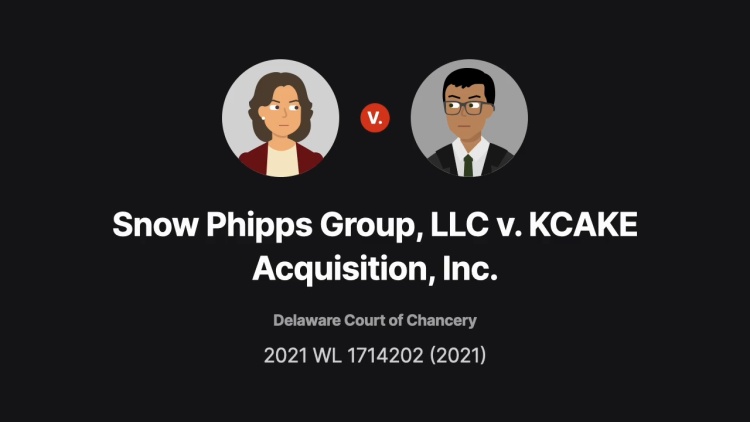Snow Phipps Group, LLC v. KCAKE Acquisition, Inc.
Delaware Court of Chancery
2021 WL 1714202 (2021)
- Written by Tammy Boggs, JD
Facts
Snow Phipps Group, LLC (Snow Phipps) (plaintiff) acquired DecoPac, a supplier of cake-decorating ingredients and products to in-store bakeries. Snow Phipps decided to sell DecoPac. In February 2020, Snow Phipps accepted a $600 million purchase bid from Kohlberg & Company LLC (Kohlberg) (defendant). Extensive due diligence and contract negotiations ensued. On March 6, 2020, the parties signed a stock-purchase agreement (SPA) and related financing agreements with a certain closing date. Kohlberg promised to use “reasonable best efforts” to obtain financing to close the transaction. The SPA stipulated remedies for a breach: Kohlberg agreed that Snow Phipps was entitled to specific performance of the contract “if and only if” certain conditions were met, including Kohlberg’s having obtained financing; otherwise, a termination fee of $33 million was the exclusive remedy for any failure to close the transaction. Around the time the SPA was signed, news of the COVID-19 pandemic was circulating. Soon after the parties signed their agreements, governments began issuing stay-at-home orders. DecoPac’s sales declined precipitously, and Kohlberg began wavering on the deal. Kohlberg did not use its reasonable best efforts to obtain financing; instead, Kohlberg prepared a bleak and uninformed outlook on DecoPac’s projected sales, provided the outlook to lenders, and, unsurprisingly, could not obtain financing. DecoPac’s sales bounced back before long because consumers still wanted decorated cakes. The transaction with Kohlberg did not close, and Snow Phipps sued for specific performance of the contract. Following trial, the court found Kohlberg had breached the agreement and failed to use reasonable best efforts to obtain financing. The court had to determine the proper remedy for the breach. Kohlberg argued that specific performance was unavailable because Kohlberg had never obtained financing and thus a condition precedent to the stipulated remedy had not occurred.
Rule of Law
Issue
Holding and Reasoning (McCormick, J.)
What to do next…
Here's why 910,000 law students have relied on our case briefs:
- Written by law professors and practitioners, not other law students. 47,100 briefs, keyed to 997 casebooks. Top-notch customer support.
- The right amount of information, includes the facts, issues, rule of law, holding and reasoning, and any concurrences and dissents.
- Access in your classes, works on your mobile and tablet. Massive library of related video lessons and high quality multiple-choice questions.
- Easy to use, uniform format for every case brief. Written in plain English, not in legalese. Our briefs summarize and simplify; they don’t just repeat the court’s language.





